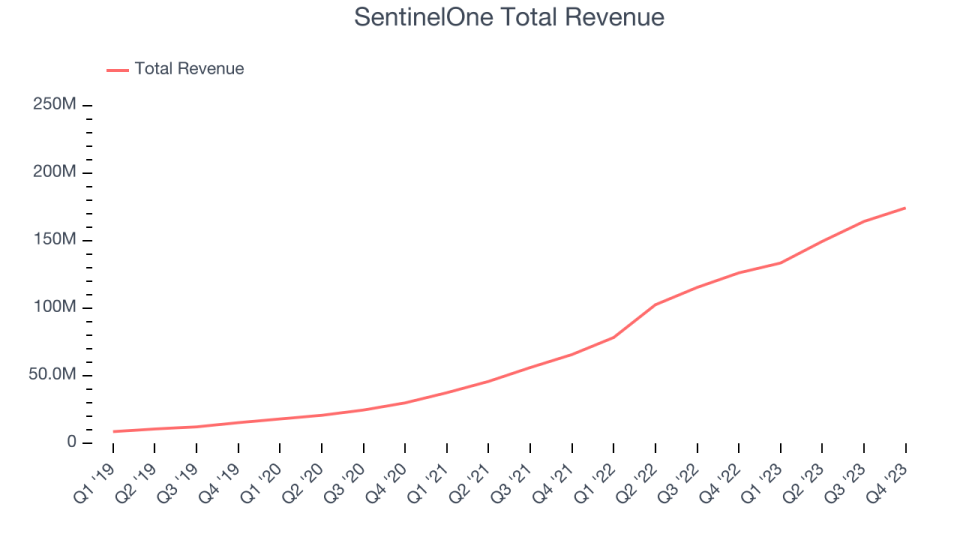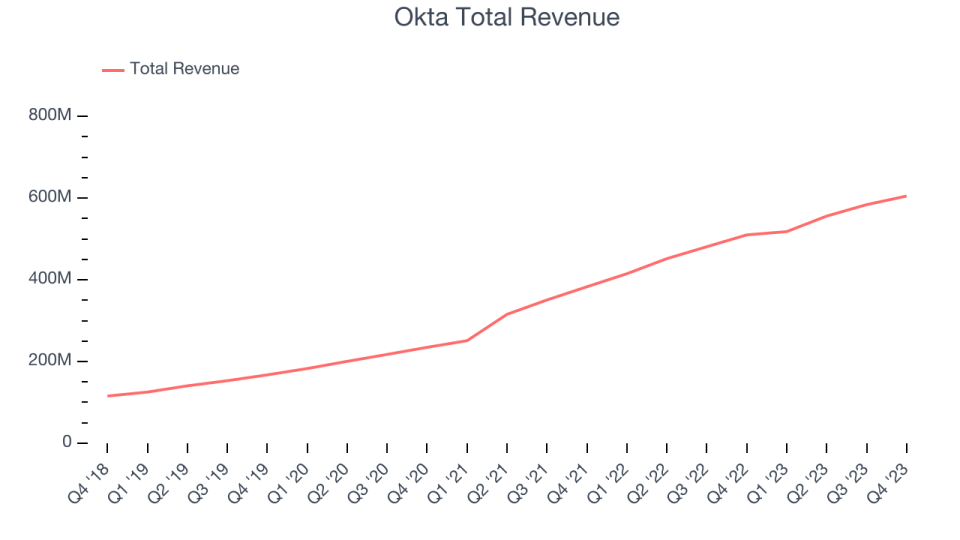S) In The Context Of Other Cybersecurity Stocks

Wrapping up Q4 earnings, we look at the numbers and key takeaways for the cybersecurity stocks, including SentinelOne (NYSE:S) and its peers.
Cybersecurity continues to be one of the fastest-growing segments within software for good reason. Almost every company is slowly finding itself becoming a technology company and facing rising cybersecurity risks. Businesses are accelerating adoption of cloud-based software, moving data and applications into the cloud to save costs while improving performance. This migration has opened them to a multitude of new threats, like employees accessing data via their smartphone while on an open network, or logging into a web-based interface from a laptop in a new location.
The 9 cybersecurity stocks we track reported a mixed Q4; on average, revenues beat analyst consensus estimates by 1.9%. while next quarter’s revenue guidance was in line with consensus. Valuation multiples for many growth stocks have not yet reverted to their early 2021 highs, though the market was optimistic at the end of 2023 due to cooling inflation. The start of 2024 has been a different story as mixed signals have led to market volatility, and cybersecurity stocks have had a rough stretch, with share prices down 13.9% on average since the previous earnings results.
SentinelOne (NYSE:S)
With roots in the Israeli cyber intelligence community, SentinelOne (NYSE:S) provides software to help organizations efficiently detect, prevent, and investigate cyber attacks.
SentinelOne reported revenues of $174.2 million, up 38.1% year on year, topping analyst expectations by 2.8%. It was a weaker quarter for the company, with its net revenue retention rate of 115% missing estimates of 118%. Its revenue guidance for the upcoming year also came in below expectations, suggesting a slowdown in demand amidst an intense competitive landscape with cybersecurity peers like CrowdStrike.
“We closed the year on a very strong note and surpassed our fourth quarter top and bottom line expectations. In fiscal year 2024, we delivered industry-leading revenue growth of 47% and operating margin improvement of more than 30 percentage points compared to the prior year,” said Tomer Weingarten, CEO of SentinelOne.


SentinelOne pulled off the fastest revenue growth of the whole group. The company added 73 enterprise customers paying more than $100,000 annually to reach a total of 1,133. The stock is down 28% since the results and currently trades at $20.12.
Is now the time to buy SentinelOne? Access our full analysis of the earnings results here, it’s free.
Best Q4: Okta (NASDAQ:OKTA)
Founded during the aftermath of the financial crisis in 2009, Okta (NASDAQ:OKTA) is a cloud-based software-as-a-service platform that helps companies manage identity for their employees and customers.
Okta reported revenues of $605 million, up 18.6% year on year, outperforming analyst expectations by 3%. It was a very strong quarter for the company, with optimistic revenue guidance for next quarter, which exceeded analysts’ expectations. Its revenue in Q4 also outperformed Wall Street’s estimates, alongside strong free cash flow.


Okta achieved the highest full-year guidance raise among its peers. The stock is up 5.7% since the results and currently trades at $92.32.
Is now the time to buy Okta? Access our full analysis of the earnings results here, it’s free.
Weakest Q4: Palo Alto Networks (NASDAQ:PANW)
Founded in 2005 by cybersecurity engineer Nir Zuk, Palo Alto Networks (NASDAQ:PANW) makes hardware and software cybersecurity products that protect companies from cyberattacks, breaches, and malware threats.
Palo Alto Networks reported revenues of $1.98 billion, up 19.3% year on year, in line with analyst expectations. It was a weak quarter for the company, with full-year revenue guidance missing analysts’ expectations.
Palo Alto Networks had the weakest full-year guidance update in the group. The stock is down 23.8% since the results and currently trades at $279.2.
Read our full analysis of Palo Alto Networks’s results here.
Zscaler (NASDAQ:ZS)
After successfully selling all four of his previous cybersecurity companies, Jay Chaudhry’s fifth venture, Zscaler (NASDAQ:ZS) offers software-as-a-service that helps companies securely connect to applications and networks in the cloud.
Zscaler reported revenues of $525 million, up 35.4% year on year, surpassing analyst expectations by 3.6%. It was a very strong quarter for the company, with an impressive beat of analysts’ billings estimates.
Zscaler scored the biggest analyst estimates beat among its peers. The stock is down 29.6% since the results and currently trades at $170.15.
Read our full, actionable report on Zscaler here, it’s free.
Varonis (NASDAQ:VRNS)
Founded by a duo of former Israeli Defense Forces cyber warfare engineers, Varonis (NASDAQ:VRNS) offers software-as-service that helps customers protect data from cyber threats and gain visibility into how enterprise data is being used.
Varonis reported revenues of $154.1 million, up 8.1% year on year, surpassing analyst expectations by 1.6%. It was a weak quarter for the company, with underwhelming revenue guidance for the next quarter and full-year revenue guidance missing analysts’ expectations.
Varonis had the slowest revenue growth among its peers. The stock is down 4.8% since the results and currently trades at $43.34.
Read our full, actionable report on Varonis here, it’s free.
Join Paid Stock Investor Research
Help us make StockStory more helpful to investors like yourself. Join our paid user research session and receive a $50 Amazon gift card for your opinions. Sign up here.

![The changing face of the cybersecurity market [Q&A] The changing face of the cybersecurity market [Q&A]](https://europeantech.news/wp-content/uploads/2024/05/Cybersecurity-business-50x50.jpg)

